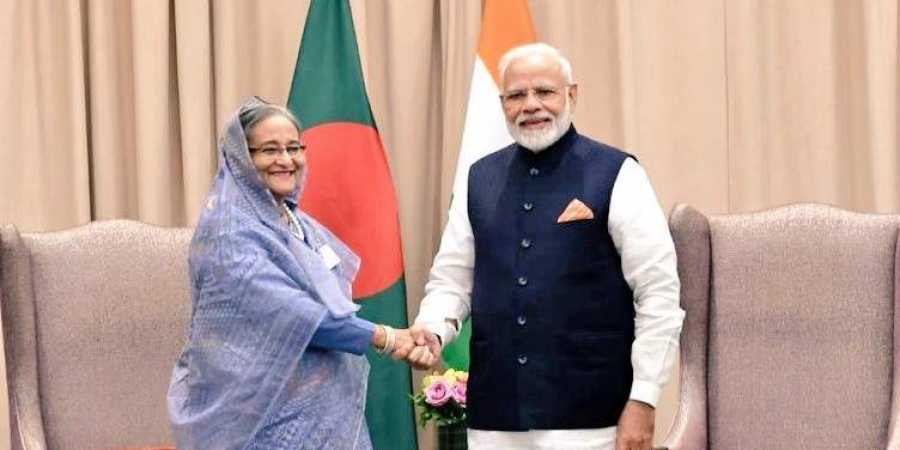The ground-breaking 5 August ceremony to build a ‘gaganchumbi’, literally ‘sky-kissing’, temple to Lord Rama in Ayodhya has sparked off some unease in neighboring Bangladesh. The event will be attended by Prime Minister Narendra Modi and several senior BJP leaders.
This will come less than two weeks after Bangladesh allowed Indian goods, meant for the northeast region, to dock at the Chittagong port on the Bay of Bengal for the first time since 1971. The cargo was later received by Trioura Chief Minister Biplab Deb at the Akhaura integrated check post, barely 200 kilometers from the Bangladesh border.
The docking of an Indian ship at Chittagong port is an amazing breakthrough in the on-off bilateral relationship between India and Bangladesh. It is certainly a major step in the economic reconnection of the subcontinent. The fractures caused by the partition of India in 1947 may not have healed, but enhanced stakes through trade and commerce are certainly expected to help.
So, if India and Bangladesh are reaffirming their relationship on the all-important economic front, why the unease in Dhaka? What is keeping Bangladesh Prime Minister Sheikh Hasina from expressing fulsome joy about the fact that her country and India are even more closely tied together?
The need to be vocal
Perhaps a more substantive query would be to look at why PM Modi has kept quiet about the Chittagong port breakthrough. There has been no mention of it even in his Sunday ‘Mann Ki Baat,’ which is interesting, because it’s very unlike Modi to not take credit for something that is legitimately due to him.
Of course, External Affairs Minister S. Jaishankar and Railways Minister Piyush Goyal virtually flagged off 10 broad gauge diesel locomotives on Monday for Bangladesh. Earlier, Jaishankar wrote to his Bangladeshi counterpart A.K. Abdul Momen emphasizing the special nature of India-Bangladesh ties and promising a special push towards reactivating trade links.
But analysts noted that India’s initiatives have come after China announced a 97 per cent duty-free tariff for Bangladeshi goods from 1 July. In fact, Indian officials secretly complain that Bangladesh is allowing itself to be pushed into a Chinese “dual deficit and debt trap”.
Certainly, Dhaka is playing it cool. PM Sheikh Hasina and her senior advisors haven’t forgotten then-BJP president and current Indian Home Minister Amit Shah’s description of ‘illegal’ Bangladeshi immigrants as “termites” in September 2018. He repeated the invective in April 2019 while promising to throw the immigrants into the Bay of Bengal.
Need to work it out together
On Sunday, in reaction to the 5 August Ayodhya event, Bangladesh’s Foreign Minister Momen warily pointed out that Dhaka won’t allow the temple construction to hurt ties between the two nations, and that India equally should not allow anything to fracture “our beautiful and deep relationship.”
Sheikh Hasina has never been more powerful in Bangladesh, which is how she has been able to forestall any objection that might have hampered economic ties with India. And so, allowing India to use the Chittagong port is not just a slap in the face of the pro-Pakistani fundamentalists who don’t want better relations with India, it’s also a message to China, which is redeveloping the port, that Dhaka will be the only one to decide who can use it.
Bangladesh was an early votary of China’s Belt and Road Initiative (BRI), joining it in 2016, the year Chinese President Xi Jinping cut a $24-billion cheque for Bangladesh. A previous contribution of $13.6 billion in aid makes China the largest investor in Bangladesh – much to Delhi’s chagrin, which prides itself on its intimate relations with its neighborhood.
Modi, meanwhile, is caught in a bind. He is wedded to his own political agenda, which means he must build the Ram Mandir in Ayodhya and implement the National Register of Citizens (NRC) and the Citizenship (Amendment) Act (CAA), even if they badly affect neighbouring friends like Bangladesh.
For the moment, the Covid-19 pandemic has mostly stilled choppy waters – said to be the reason why outgoing high commissioner to Bangladesh Riva Ganguly Das wasn’t able to get a farewell call with PM Hasina. The fact that Das is being succeeded by Vikram Doraiswami, a Chinese speaker, is acknowledgement that Delhi wants to improve ties with Bangladesh and not let China further insinuate itself into Dhaka’s affections.
The Pakistan issue
But there is a third problem with the India-Bangladesh relationship – Pakistan. Increasingly, it seems, Modi is looking at India’s neighbourhood through the Pakistani prism and this is beginning to upset several neighbours. The Afghans are already complaining, pointing out that Indian elites are interested in Afghanistan only to the extent that Kabul is critical of everything Pakistani.
Something similar is happening with Bangladesh. When Pakistan Prime Minister Imran Khan called Hasina a few days ago, Delhi was upset enough to wonder why he had called in the first place and whether she agreed with his constant cribbing about Jammu and Kashmir. (She didn’t.)
“What’s wrong if Pakistan dials us,” Bangladesh Foreign Minister A.K. Momen asked in a conversation with The Hindu, somewhat exasperated. To a Dhaka TV channel, Momen admitted telling the Pakistanis that they must own up to the 1971 ‘genocide’ if they want the relationship to improve.
Certainly, the special India-Bangladesh relationship is here to stay – but it would significantly help if the political elites, led by the Prime Minister himself, and not just the bureaucratic ones, nurtured it from time to time.
*Jyoti Malhotra is the National & Strategic Affairs Editor. She has been a journalist for more than three decades covering foreign affairs, politics and national affairs at some of the top publications in the country.


